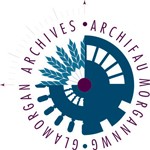David Davies, often cited as the first Welsh millionaire, was responsible for the development of railways within Wales and was also the man behind the creation of Barry Docks. Alongside these enterprises, he also found success as a colliery owner, earning the nickname “Davies the Ocean” for his development of the Ocean Coal Co. Ltd, which was incorporated 130 years ago in April 1887.

David Davies [DCOMC/30/3/78]
Davies entered the coal mining business in the 1860s, first hitting coal in April 1886, 15 months after the sinking of his first colliery, Maindy Colliery in Ton Pentre, Rhondda. In 1867 David Davies & Company was formed and new sinkings continued in the Rhondda for the next ten years. Davies won a worldwide market with his Ocean Steam Coal and his collieries continued to be a success. The whole enterprise became the Ocean Coal Co. Ltd, incorporated in 1887, with Davies controlling the main portion of the capital.

Extract from Park Colliery annual return for the year 1889 [D1400/2/2/1]
Records of the Ocean Coal Co. Ltd survive at Glamorgan Archives and have recently been catalogued as part of the Wellcome Trust funded Glamorgan’s Blood project. The records span the date range 1889-1944 and can be used to provide insight into the running of the financial side of the business through records such as annual returns and pay books, and the practical side of the business through illustrated volumes depicting sections of the coal face. The records can also be drawn upon to give a glimpse into working conditions, with accident and compensation records providing first-hand accounts of the dangers of the mining industry through entries relating to the Ocean Coal Collieries Maindy, Park, Dare, Western, Eastern, Garw, Lady Windsor, Deep Navigation and Avon.

Geological cross section showing the working face at Park Pits [D1400/4/2/1]
Paybooks and accident and compensation registers provide an insight to the lives of those working at the coal face, but an understanding of the people involved at the higher level of the coal industry can also be gained from a volume of royalty and wayleave payments within the collection. Royalties and wayleaves were the payments made to the owner of the land being worked by the colliery company and the volume gives an indication of how much money individuals received simply for the use of their land. Contrasting this volume with the colliers’ paybooks and accident and compensation registers within the collection serves to highlight the difference that existed at each end of the pay scale.
The collection also contains Special Rules issued to the Ocean Collieries Coal Co. Ltd. under the Coal Mines Regulation Act of 1887, which demonstrate how the government were legislating the mining industry in the late 19th century. These documents show the relationship between the individual Ocean collieries and the H M Inspector of Mines, and they also tell us something about the Ocean Coal workforce. The documents are written in both English and Welsh, indicating that a proportion of the workforce were Welsh speakers only. The fact that the company had the documents published bilingually shows that they understood this and were keen for the whole of the workforce to adhere to the rules.

A page from the Special Rules issued to the Ocean Collieries Coal Co. Ltd. under the Coal Mines Regulation Act 1887 showing bilingual content [D1400/4/3/2]
The records of the Ocean Coal Company Ltd are an important resource for David Davies’ success as a coal magnate and as a primary source for workings of the coal industry in the late 19th and early 20th centuries. The Ocean Coal Company Ltd’s records, and those of its predecessor the David Davies Company, are now available to view on our catalogue, Canfod. See references D1400, D1402 and DX316 for detailed listings of the records that the Archives holds.
